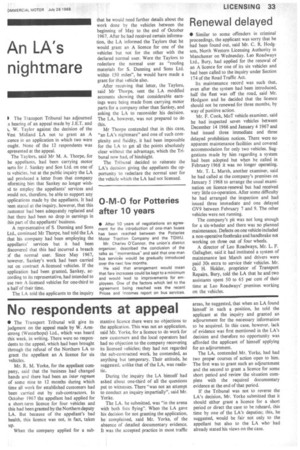No respondents at appeal
Page 35

If you've noticed an error in this article please click here to report it so we can fix it.
• The Transport Tribunal will give its judgment on the appeal made by W. Armstrong (Westerhope) Ltd., which was heard this week, in writing. There were no respondents to the appeal, which had been brought through the refusal of the Northern LA to grant the appellant an A licence for six vehicles.
Mr. R. M. Yorke, for the appellant company, said that the business had changed hands and there had been an inter regnum of some nine to 12 months during which time all work for established customers had been carried out by sub-contractors. In October 1967 the appellant had applied for a short-term licence for four vehicles and this had been granted by the Northern deputy LA. But because of the appellant's bad health, this licence was not, in fact, taken up.
When the company applied for a sub stantive licence there were no objections to the application. This was not an application, said Mr. Yorke, for a licence to do work for new customers and the local operators had had no objection to the company recovering its licensed vehicles; they had not regarded the sub-contracted work, he contended, as anything but temporary. Their attitude, he suggested, unlike that of the LA, was realistic.
During the inquiry the LA himself had asked about one-third of all the questions put to witnesses. There "was not an attempt to conduct an inquiry impartially", said Mr. Yorke.
The LA, he submitted, was "in the arena with both fists flying". When the LA gave his decision for not granting the application, he complained, said Mr. Yorke, of the absence of detailed documentary evidence. It was the accepted practice in most traffic
areas, he suggested, that when an LA found himself in such a position, he told the applicant at the inquiry and granted an adjournment for the necessary information to be acquired. In this case, however, lack of evidence was first mentioned in the LA's decision and therefore no opportunity was afforded the applicant of himself applying for an adjournment.
The LA, contended Mr. Yorke, had had two proper courses of action open to him. The first was to grant such an adjournment and the second to grant a licence for some short period and review the situation complete with the required documentary evidence at the end of that period.
If the Tribunal was not to reverse the LA's decision, Mr. Yorke submitted that it should either grant a licence for a short period or direct the case to be reheard, this time by one of the LA's deputies; this, he suggested, would be fair not only to the appellant but also to the LA who had already stated his views on the case.












































































































